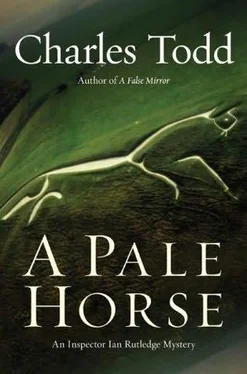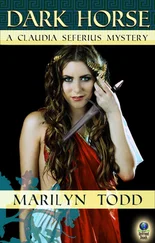Charles Todd - A pale horse
Здесь есть возможность читать онлайн «Charles Todd - A pale horse» весь текст электронной книги совершенно бесплатно (целиком полную версию без сокращений). В некоторых случаях можно слушать аудио, скачать через торрент в формате fb2 и присутствует краткое содержание. Жанр: Полицейский детектив, на английском языке. Описание произведения, (предисловие) а так же отзывы посетителей доступны на портале библиотеки ЛибКат.
- Название:A pale horse
- Автор:
- Жанр:
- Год:неизвестен
- ISBN:нет данных
- Рейтинг книги:5 / 5. Голосов: 1
-
Избранное:Добавить в избранное
- Отзывы:
-
Ваша оценка:
- 100
- 1
- 2
- 3
- 4
- 5
A pale horse: краткое содержание, описание и аннотация
Предлагаем к чтению аннотацию, описание, краткое содержание или предисловие (зависит от того, что написал сам автор книги «A pale horse»). Если вы не нашли необходимую информацию о книге — напишите в комментариях, мы постараемся отыскать её.
A pale horse — читать онлайн бесплатно полную книгу (весь текст) целиком
Ниже представлен текст книги, разбитый по страницам. Система сохранения места последней прочитанной страницы, позволяет с удобством читать онлайн бесплатно книгу «A pale horse», без необходимости каждый раз заново искать на чём Вы остановились. Поставьте закладку, и сможете в любой момент перейти на страницу, на которой закончили чтение.
Интервал:
Закладка:
"The Devil," Hugh retorted. "It must have been." He had never been so shaken.
"No, it was a man," Bill said. "He was wearing shoes."
"Do you think the Devil goes about with that cloven hoof in plain sight?" Hugh demanded, regaining a little of his confidence.
"What are we going to do about it?" Tad asked. "If we tell, we'll be blamed. Pa will take a strap to me!"
"What if Vicar won't let us come to service?" Robbie added. "Mama won't like that."
"We'll swear a blood oath never to tell," Hugh suggested dramatically. "I've my pocketknife. We'll cut our thumbs and swear."
"I don't want my thumb cut," Robbie said, and to his great shame, began to cry.
"Ma will see the cuts," Tad agreed. "She won't give us any peace over them until she knows everything."
"Why can't we just swear?" Johnnie asked. "And we'd better hurry about it, or someone will be up milking before we're back in our beds."
They swore, as fierce an oath as Hugh could devise on the spot.
"May our tongues blacken, and our faces run down our chins like hot pudding, if we speak one word about tonight to any soul, living or dead, good or evil. So help us God!"
They turned then to hurry home. But Johnnie spoke for all of them when he said, halfway there, "What if he follows us? What if he wants us to be dead, because we've seen him?"
It wasn't until the next morning that a caretaker stumbled across a dead man in the ruins of Fountains Abbey.
The owner of Studley Royal was in London with his family, and so the caretaker took it upon himself to summon the police.
The local man, standing over the body, took note of three things. That there was no immediate indication of cause of death. That the man was wearing a cloak like a monk's, complete with a hood that had fallen away from his face. And that over his face there was a respirator, one from the war. He reached down and pulled the mask away.
He didn't recognize the face staring back at him.
"No one from around here," Inspector Madsen said aloud to the two constables standing at his back.
"No," the older of the two said. "But what's he doing here?"
"If I knew that," Madsen answered repressively, "I might know how he died and who has killed him. If anyone did." He had been called out before he'd had time to eat his breakfast and his wife had had a thing or two to say about that. She was a great one for cooking, and expected those she cooked for to enjoy and appreciate her efforts.
"Yes, sir." The younger constable trailed him as he turned to survey the cloisters and began a slow circle. "There're three puddles of wax, sir, on that stone in the center. A stub of candle over here, and that book you've noticed, just by his foot." He had been first on the scene.
Madsen examined the wax puddles, noted they were in the shape of a triangle, and grunted. He went next to the stub of candle. The kind, he told himself, his unthrifty wife would throw out. She was particular about her candles.
"Was this one longer to start with?" he mused. "Was this the third night of a vigil? It would explain the three puddles."
"The caretaker swears no one had been here before last night. He says he'd have noticed."
"Any sign that someone else was with the dead man?"
"It's hard to say, not knowing how active he himself was."
"All right, then, let's have a look at yon book."
Madsen picked it up and closed it to examine the title on the spine. "Alchemy, for God's sake." He flipped it open and saw the name of one Albert Harris Crowell on the name plate, and under it, Nether Bromley School.
"Is this Crowell, then?" he asked, lifting his gaze to Constable Hood, his voice flat.
"No, sir. I've seen Mr. Crowell, sir. He comes sometimes to The Dog and Cart-that's the pub near Dilby. A quiet man. Before the war he was schoolmaster in Nether Bromley, and now he's at Dilby School. Well respected, from what I'm told."
The younger constable stirred. "He was a conscientious objector in the war, sir. I've heard my father speak of it."
Madsen turned his gaze to Constable Pickerel. Pickerel's father had been a policeman as well, retiring from the Elthorpe force as sergeant just at the end of the war. Six months before Madsen himself arrived. "How does your father know what Crowell did in the war?"
"My father also drops in to The Dog and Cart from time to time. It's the talk there, some evenings." Madsen was still staring at him, and Pickerel found himself adding, "The pub was never on his patch, you might say, and he likes that. Nobody to bring up what's past."
The next village over might as well be in a foreign land, in the eyes of most. Though the war had changed that notion to some extent, people clung to their prejudices.
"Does he never come to Elthorpe? Crowell?" Madsen asked him.
Pickerel glanced at Hood for confirmation. He shook his head.
Madsen held up the book. "Then he's made an exception last night. Maybe he can tell us who it is we have on our hands."
L
ater that morning he found the schoolmaster in a classroom, seven or eight boys busy with a project involving, as far as Madsen could tell, catapults and castle walls of small mud bricks.
Crowell came out to speak to the inspector. Madsen tried not to stare at him like a specimen under glass, but this was the first time he'd set eyes on the man. Youngish, with that fair slimness that came from long lines of pedigree. His manner was composed, and his voice well bred. Glasses perched on the end of his nose, and he removed them as if suddenly aware that they were there.
If he felt any anxiety about confronting an inspector of police, he hid it well.
"Inspector Madsen, isn't it?" Crowell extended his hand. "What brings you to Dilby? Not one of my students, I hope." He smiled and nodded his head toward the half-closed door behind him. "They're a handful, but there's no meanness, I can tell you that."
"Yes, sir." Madsen took the proffered hand, then held out his own to Constable Hood just behind him. Hood passed him the book. "Can you tell us, sir, if this is by any chance your property?"
Crowell took it, frowning. "Yes, here's my name in it, but if you'd asked me, I'd have told you my copy is in the bookshelf in my office."
"Shall we have a look?"
Crowell cast a glance into his classroom. Three of the lads were staring back at him, their eyes large with alarm, as if the police had come for them. He made a mental note to discover what mischief they'd been up to, and said repressively, "Young Tredworth, mind you finish your section of the wall. Don't be standing about just because I'm not there. That applies to your workmen as well. I want to see progress when I return."
Hugh Tredworth ducked his head and turned back to his task. His cronies followed his example with suitable haste. "Very well, then," Crowell said to the policemen, and led the way.
As Madsen followed him down the passage, he asked Crowell, "Interested in alchemy, are you, sir?"
"Not particularly. When I teach science, I often make more progress with something that's exciting than I do with dull experiments. I say, how did you come by this? It's an old book, I doubt it's still in print."
"We'll attend to that in a moment, sir. This your office, is it?"
Crowell went in and crossed directly to the low bookshelf behind his desk. But when he put his finger out to tap his copy, the finger stopped in midair. "It isn't here." He turned back to Madsen, frowning. "I'm at a loss to explain how it got away, but I thank you for taking the trouble to return it, Inspector." He slid it into its proper slot, then straightened and waited, as if expecting Madsen either to take his leave or explain why it was an inspector and a constable had come to deliver a lost book.
"The problem is," Madsen began slowly, "that this book-your book-was discovered lying by the foot of a dead man."
Читать дальшеИнтервал:
Закладка:
Похожие книги на «A pale horse»
Представляем Вашему вниманию похожие книги на «A pale horse» списком для выбора. Мы отобрали схожую по названию и смыслу литературу в надежде предоставить читателям больше вариантов отыскать новые, интересные, ещё непрочитанные произведения.
Обсуждение, отзывы о книге «A pale horse» и просто собственные мнения читателей. Оставьте ваши комментарии, напишите, что Вы думаете о произведении, его смысле или главных героях. Укажите что конкретно понравилось, а что нет, и почему Вы так считаете.











